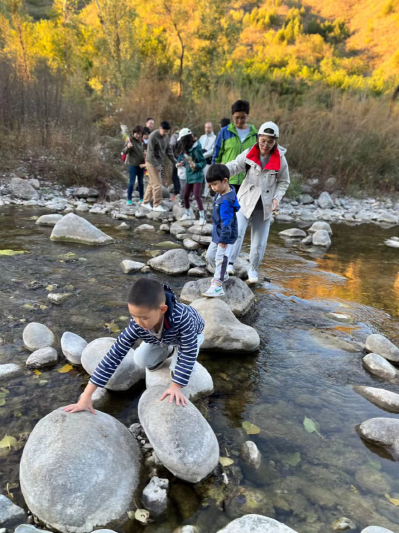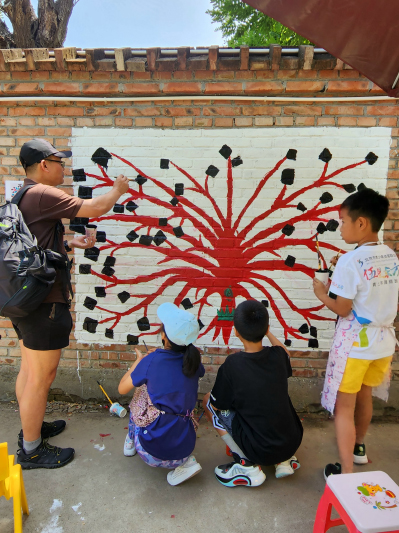| China |
| Young Chinese parents embrace active parenting styles | |
|
|
 Parents and children engage in a nature exploration activity in Miyun District, Beijing, in October 2022 (COURTESY PHOTO)
In the early 2010s, the hashtag "tiger parenting" swept through China's online communities and media landscape. The term refers to an extremely strict approach of parents toward their children, especially regarding their academic achievement. At that time, many parents believed that grades were the most essential elements determining a student's future, and a wave of extra classes on major subjects took over many regions, with millions of parents thrusting their kids into these classes after school and on weekends.
In recent years, however, parents are turning their attention toward children's health, sporting abilities and aesthetics ideas, and tend to share experiences with their children in nature. These, and many other activities which academically minded parents had deemed useless, are on the rise, according to a report on young parents' changing parenting styles, jointly published by Xinhua News Agency and Xiaohongshu, a popular lifestyle and e-commerce platform. Drawing data from all child-related posts created on Xiaohongshu in 2023 by young parents, mostly born in the 1980s and 1990s, the report characterized today's prevalent parenting style as "simple, natural, encouraging and relaxed." "During my wife's pregnancy, I hoped my child would achieve something great and extraordinary," Liu Chunlin, the 31-year-old father of a 1-year-old boy, told Beijing Review. "But now, I want him to be a happy and healthy ordinary person with integrity and honesty. Achievements are not that important." Companionship with participation Liu said he believes young parents' changing attitude to parenting comes from their expectation of their children primarily as companions, instead of as providers when they get old. "I regard my son as my friend and companion," Liu said. "I feel happy enough whenever he calls me daddy. This is the same for other parents in my social circle. We share the idea that the emotional gifts from our children are more valuable than any possible material returns." According to a report from the China Research Center for Children's Industry, spending on children accounts for more than 40 percent of total consumption in approximately 80 percent of Chinese households. Of these expenses, parents' top priorities are to promote parent-child relationships and make their children more well-rounded. Liu aspires to be a reliable friend, a loving supporter and a patient listener to his son. "I'd like to work toward becoming a tender and amicable father, rather than a strict and silent one, and I am always there for my son after work," he said According to the Xinhua-Xiaohongshu report, one of the most distinctive features of the posts shared by young parents is the increasing participation of fathers in their children's development. Posts under the topic "new daddy's parenting experience" gained more than 3 billion views last year, with naiba, literally milk daddy, Chinese netizens' nickname for novitiate fathers, sharing how they helped babies with burping and turning over, and played a role in changing diapers, reading stories and singing lullabies. "I help my son with eating and swimming, playing with toys, and also read stories to him," Liu said, adding that he often devotes his whole weekend to these activities. "Children who grow up in families with high levels of participation from fathers tend to have a clearer sense of purpose, more faith in their own competence and very distinctive personalities," Rao Juan, organizer of an extracurricular leisure activities studio in Beijing, told Beijing Review. "And therefore, in our offline outdoor activities to boost parent-child relationships, we assign some tasks that need to be completed by fathers and children together, such as hiking and exploring in mountains, agricultural activities in fields, and setting up camps and stoves using tools."  Participants in a parent-child activity create a mural in Chaoyang District, Beijing, on June 8 (COURTESY PHOTO)
Healthy and natural Young parents prefer taking their kids outdoors, especially into nature in places such as city parks and suburban areas. The report found more than 2.6 million parents had shared their experiences of walking with their children outside their homes in 2023, a year-on-year increase of 300 percent. Some parents were zealous about taking their children on city walks, the increasingly popular pastime of exploring city neighborhoods and urban areas on foot, while another 1.7 million parents shared experiences of enjoying exploring natural environments with their children. The flocks of parents busily rushing their children to extracurricular classes are gradually being replaced by young parents spending hours walking with their children in urban and natural environments. Parents have even come up with a term for this activity, liuwa, which means "walk the kid." Rao has observed the changing needs of her customers in recent years, and has been making adjustment to her services. "Young parents are good at having fun, and they respect their children's needs and feelings," Rao said, adding that the widely praised activities in her studio involve fun, DIY, outdoor and sporting elements and allow participants to experience country life and natural scenes. These activities usually take place in suburban areas of Beijing and can be completed within 3 hours, catering to children's attention spans. "The participants have a clear preference for athletic activities after COVID-19. I think parents are more aware of children's health after the pandemic, and they like to see their kids running around rather than sitting down for long periods now," Rao added. Athletics aside, parents are showing an increasing demand for quality programs that nourish children's aesthetic sensibilities. "There are a large number of parents of 4 or 5-year-olds, who are asking for 'relaxing, playful courses that can nurture aesthetic concepts'," Hu Chunxiu, who runs a private art education studio in Haidian District, Beijing, told Beijing Review. "These parents are showing an increasing interest in participating in their children's aesthetic cultivation, accompanying them to visit museums, art galleries and exhibitions, often without utilitarian purposes. Instead, they regard these activities as a supplement to school education and a chance to fulfill their children's potential," Hu explained. Hu said she is deeply impressed by parents' willingness to spend on their children's well-rounded development, which usually takes years to accomplish. "Many of my students have attended my classes for over five years, and in some cases, 10 years," she explained. "I think aesthetic abilities are being emphasized by more parents, and they can fully appreciate how important it is for a person to discover, acknowledge and admire the beauty in our daily lives." While loosening the restraints on children, parents are also placing higher requirements on themselves. The report found young parents are more willing to discuss with and learn from others about challenges in raising kids. There are over 3 million posts from parents on Xiaohongshu with the topic "What should I do in this case?" in 2023, ranging from issues about breast feeding to linguistic obstacles and communication skills. Their questions have been answered by around 5 million experience-sharing posts. In addition to seeking help on social media platforms, other popular methods include turning to elder family members for advice and attending parenting classes. "Some parents have come to me with questions about how to refuse their children's requests and how to appease their negative emotions. I shared a lot with them," Rao said. "I always tell new parents, as their child grows, they need to continue updating and enriching their parenting skills. This requires more effort but is better in the long run." Copyedited by G.P. Wilson Comments to zhangyage@cicgamericas.com |
|
||||||||||||||||||||||||||||
|
